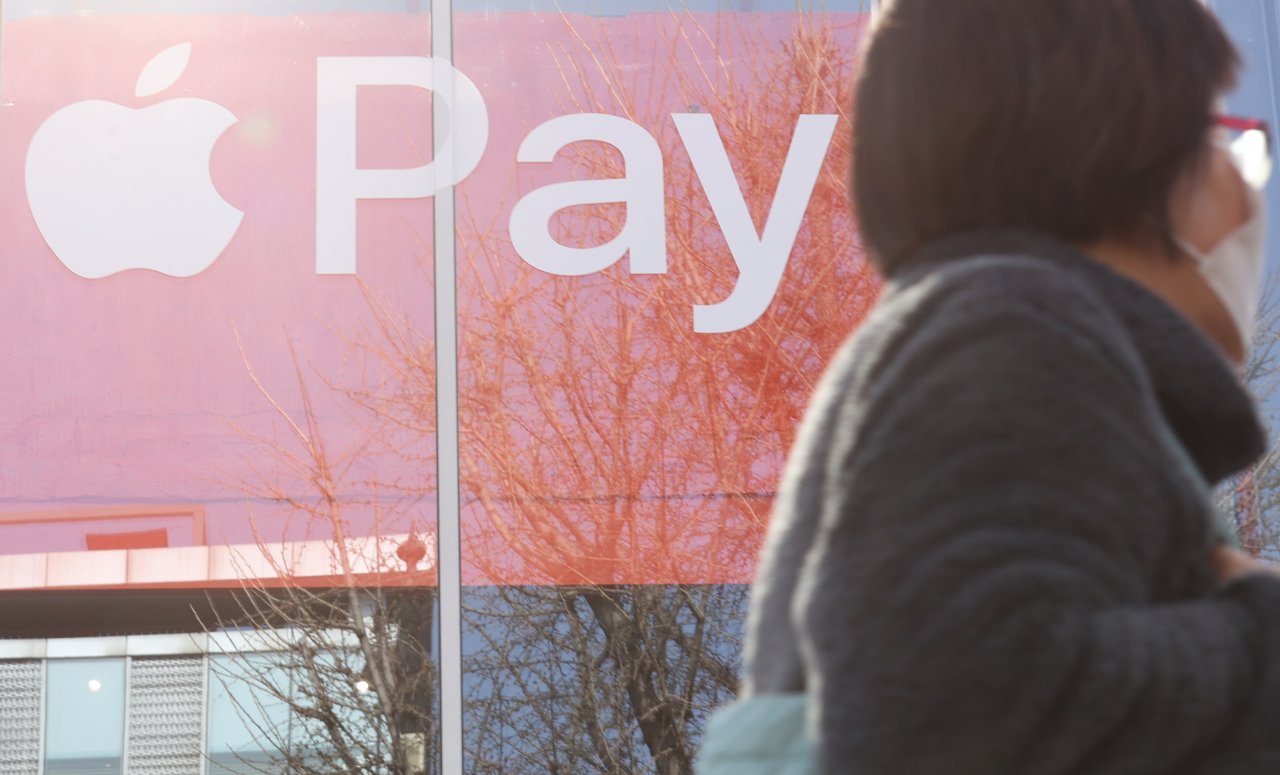[From the scene] Hype vs. reality of Apple Pay in Seoul
Despite the charm of its newness, many users complain about the lack of NFC readers in stores
By Song Seung-hyun, Jo He-rimPublished : March 28, 2023 - 15:56

Last Sunday in Seoul’s bustling Hongdae district, a couple in their 20s walked into a crowded Baskin Robbins store, and inquired if they could pay using Apple Pay.
Moments later, their payment went through and their faces beamed with joy.
“The hype was real. It (Apple Pay) is so fast and convenient. We are addicted to the ‘ding’ sound that we hear when the payment goes through on Apple Pay,” the couple said.
Apple Pay made its official debut in Korea on March 21, almost a decade after the service was launched in the US back in 2014. On the first day alone, more than 1 million iPhone users registered for membership, according to its official partner here, Hyundai Card.
In Korea where Samsung dominates almost 80 percent of the market share in smartphone sales, Samsung Pay has enjoyed a near monopoly amid the absence of Apple Pay. For years up until recently, iPhone users had long been marginalized.
With Apple Pay’s arrival, industry people may be offering a mixed outlook for its Korean success, but iPhone users are reacting explosively, sharing their experiences through online communities like Asamo, a popular Naver blog for Apple enthusiasts.
“I have been using Apple Pay every day for a week. Just to try it out, I even purchase things that I don’t need,” a commentator said on Asamo.
Due to a sudden surge in customers, there was some fuss about the partial malfunctioning at some stores, mainly among Visa card users, in the earlier days of the service. But over the weekend, most of these inconveniences were solved, impressing many with its new features.
Apple Pay, based on near-field communication technology, works from a distance, unlike Samsung Pay, which requires customers to hold their phones close to the reader. Users say this contactless payment is much more hygienic compared to making a payment with credit cards or Samsung Pay.
While Samsung Pay doesn’t work when battery life is less than 5 percent, Apple Pay works even with only 1 percent battery life. Samsung says it needs to limit the use of the service for stable signal transmission.
Despite there being Apple Pay fever, many users complained about the lack of stores supporting the service.
There are some 2.9 million stores nationwide but only 70,000 of them are estimated to have installed NFC readers that work with Apple Pay, according to industry estimates.
“I heard that only Hyundai Cards work with Apple Pay and immediately applied for a new card online,” Hwangbo Kyung-sun, an office worker in Seoul, said. “But I feel disappointed because I haven't been able to use it as much as I thought due to the limited number of stores (that have readers).”
Chung Tae-young, vice chairman and CEO of Hyundai Card, compared the issue to the dilemma between the chicken and the egg.
“Whichever comes first, the important thing is that NFC devices that are fast, convenient and even hygienic should be made available more widely. It’s already too late,” he said in his Instagram post on Friday, adding, “What’s important is that Apple Pay is here to create a virtuous cycle in the market.”
Ironically, the hype for Apple Pay also sheds a spotlight on what other rival payment services currently have an edge in.
“With Samsung Pay, I can literally go through a day without a wallet. It is hard for me to give up this lifestyle,” Park Ji-yeon, a Galaxy phone user in her 30s, said.
Industry watchers say Apple Pay’s arrival will heat up competition among payment players from tech companies to credit card issuers.
Samsung Pay has already ramped up efforts to strengthen its dominant market position by teaming up with Naver and Kakao, the nation’s top two internet companies.
Credit card companies are also paying keen attention to the initial partnership between Hyundai Card and Apple Pay as they prepare to provide their own Apple Pay services to differentiate themselves.
According to the Credit Finance Association, Shinhan Card was the largest credit card issuer with 19.6 percent of the market share as of the end of last year, closely followed by Samsung Card with 17.8 percent, Hyundai Card with 16 percent and KB Kookmin Card with 15.3 percent.






![[KH Explains] How should Korea adjust its trade defenses against Chinese EVs?](http://res.heraldm.com/phpwas/restmb_idxmake.php?idx=644&simg=/content/image/2024/04/15/20240415050562_0.jpg&u=20240415144419)













![[Today’s K-pop] Stray Kids to return soon: report](http://res.heraldm.com/phpwas/restmb_idxmake.php?idx=642&simg=/content/image/2024/04/16/20240416050713_0.jpg&u=)